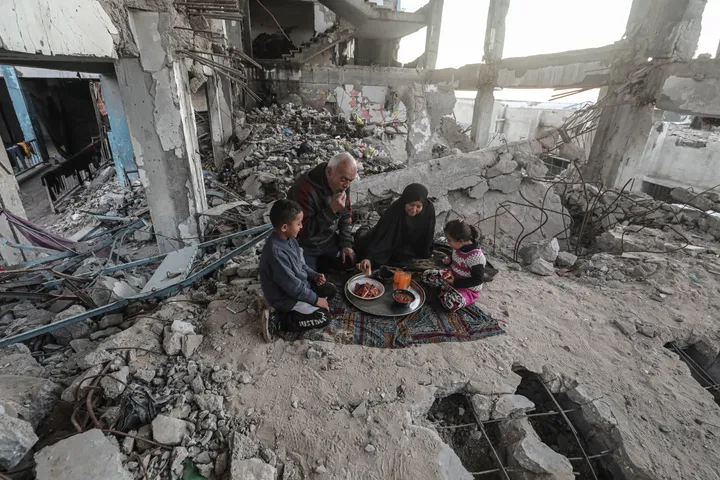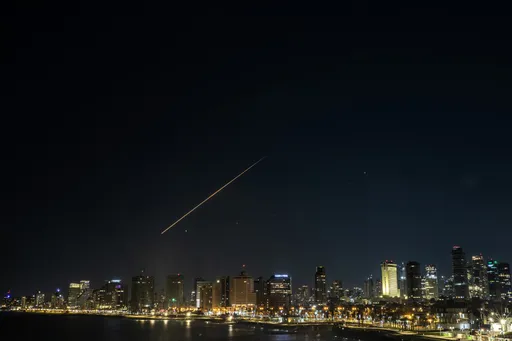Every year thousands of Christians congregate at churches in Jerusalem and the occupied West Bank to mark Easter. It’s a day of reverence and celebration.
But amid Israel’s indiscriminate war on Gaza where more than 32,000 people have been killed since October 7, only a few people gathered at the main catholic service for Easter Sunday, held at the Holy Sepulchre Church in Jerusalem—believed to have been built over Jesus’ tomb.
“We are living today in a time where Christians are hardly celebrating, either Easter or a few months ago, Christmas - the beautiful parties and celebrations were all cancelled due to the war,” Jack Sara, president of Bethlehem Bible College in Palestine, told TRT World.
“It is really sad. I mean, you walk in the streets and it's just, hard and, difficult. And the presence of the military makes it look even harder and in addition to this, people from the West Bank cannot come and celebrate Easter on any side either this week.”
This year, the people in Palestine, where Christianity was born, have also encountered significant restrictions on entering Jerusalem’s Old City to observe the occasion.
“Palestinian Christians in particular, have faced restrictions for the past 75 years, but far more this year,” Xavier Abu Eid, a political scientist based in Jerusalem, told TRT World.
“It's not something new, and particularly since the 1967 occupation and even more with the construction of the illegal Israeli annexation wall,” he said.
“Remember that Palestinian Christians amount to almost 800,000 to 1 million people worldwide, but less than 200,000 people are left in the land of historic Palestine, whether in what is now called Israel or the occupied territory of Palestine. So the vast majority of Palestinian Christians, people who were either born or descend from this country, are not even allowed to get close to their holy sites.”
'Specific permits'
Israeli authorities mandate that Muslim and Christian Palestinians obtain specific permits to pass through military checkpoints encircling the sacred city if they want to access religious sites like the Al-Aqsa Mosque and the Church of the Holy Sepulchre.
These permits are subject to stringent conditions, requiring Palestinians to possess an "ID card" issued by the Israeli military following a "security check”.
Subsequently, applicants must download a dedicated mobile app and submit their permit requests, which are frequently denied.
Abu Eid explains that the majority of Palestinian Christians in the occupied territories of the occupied West Bank, Gaza, and East Jerusalem reside in the area encompassing Ramallah, Jerusalem, and Bethlehem, with Bethlehem being the most populous.
This area is heavily affected by illegal Israeli settlements, infrastructure, and military presence, he said, leading to restrictions on movement and shrinking of Palestinian towns like Beit Jala, a Palestinian Christian town in the Bethlehem Governorate of Palestine.
“It's important to understand what's going on now, because it's not like the occupation just decided to prevent Palestinian Christians and Muslims from accessing Jerusalem on our holy days. It's actually a policy that has to be dealt with every single day in our lives,” Abu Eid, the political scientist, told TRT World.
Israeli police say they impose restrictions due to safety concerns during the "Holy Fire" celebration at the Church of the Holy Sepulchre, in which a flame taken from Jesus’s tomb in the church is used to light the candles of worshippers.
Christian leaders opposed altering the traditional ceremony, viewing it as part of Israel's policy to displace Palestinians.
“It's not just about the security needs of this occupation, which, of course, we totally reject that there is something called the security needs of an occupation. What we have here is a clear attempt to deny us of our very existence as Palestinians and, of course, as Palestinian Christians.” Abu Eid said.
Besides the restrictions, Jack Sara, the president of Bethlehem Bible College in Palestine, says Christians are not celebrating Easter with high spirits due to the deaths of at least 32,782 Palestinians in Israeli attacks on Gaza since October 7.
“No one is stopping anyone from celebrating Easter. The people are mourning as they see people are dying. So no one is pushing anyone to stop celebrating. It is just that there are unlimited restrictions imposed on us.
“There are checkpoints that are not bringing people in. The Israeli military has closed the West Bank so Palestinians from the West Bank cannot come to Jerusalem and therefore they cannot celebrate Easter in Jerusalem.” Sara added.
Churches in Jerusalem, Bethlehem, Jericho, and Gaza, which adhere to the
Western calendar, observed Palm Sunday on March 31. In contrast, churches in the unified governorates of Ramallah, Nablus, and Jenin will celebrate Easter based on the Eastern calendar on May 5 this year.
“This year we had way less permits, virtually no permits. And it would not be an exaggeration to say that there are no permits for the celebrations,” Abu Eid said.
“But we still go to our churches outside Jerusalem, and we still celebrate the message of Easter, which is defeating death with life, which is a pure message of hope. A Palestinian message delivered to the rest of the world.”























